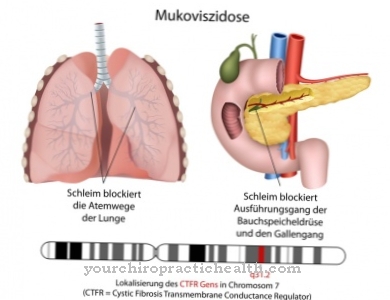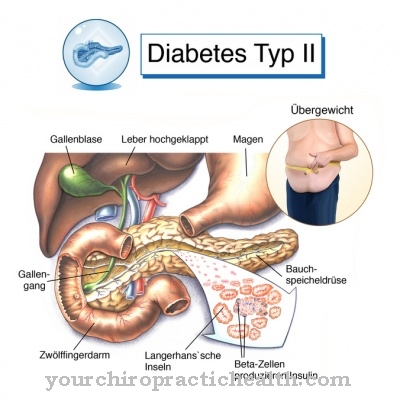At a Thyroid hormone resistance Although enough thyroid hormones are produced, they cannot have a sufficient effect on the pituitary gland or the peripheral organs. The cause is a genetic defect in thyroid hormone receptors. The symptoms of thyroid hormone resistance are very variable.
What is thyroid hormone resistance?

© Axel Kock - stock.adobe.com
At a Thyroid hormone resistance the two thyroid hormones thyroxine (T4) and triiodothyroxine (T3) are not sufficiently effective. There are two forms of thyroid hormone resistance. On the one hand there is the general peripheral thyroid hormone resistance and on the other hand the isolated thyroid hormone resistance to the pituitary gland or the other organs. The thyroid hormones are produced in the follicular epithelial cells of the thyroid gland.
They are represented by two hormones such as thyroxine (T4) or the more effective triiodothyroxine (T3). Both hormones regulate the energy metabolism and the growth of cells. Hence they are vital. They act on the pituitary gland and other peripheral organs through receptors. They have no effect on the brain, spleen and testicles, but they increase the metabolism in all other organs and tissues.
They also have an impact on the activity of the endocrine glands. They exert this influence through the pituitary gland. They regulate the sugar metabolism by increasing insulin production and stimulate the activity of the adrenal glands. It is also known to have an influence on sex hormones.
causes
So-called receptors are necessary for the activity of the thyroid hormones. The molecules dock to these receptors and can thus develop their effectiveness. However, if the receptors are defective or insufficiently effective due to a mutation, there is thyroid hormone resistance despite sufficient hormone concentration. Usually the mutation is inherited as an autosomal dominant trait.
Since the thyroid hormones cannot bind sufficiently to the receptors, their effectiveness is limited. Because of this low effectiveness, the body produces even more thyroid hormones. Therefore, in the case of thyroid hormone resistance, the concentration of thyroid hormones is increased. Effectively, the function can be normal, increased or decreased with the increased hormone concentration.
This results in a variable clinical picture, which can only be treated individually. The hormone thyrotropin (TSH) is normal or slightly increased. TSH is also known as thyroid stimulating hormone. It is produced in the anterior pituitary gland and is responsible for regulating thyroid hormone production. With low thyroid hormone concentrations, the concentration of thyrotropin increases, which stimulates the thyroid to produce hormones.
If the thyroid hormone concentration is increased, the concentration of TSH decreases. Subsequently, the concentration of thyroid hormones also decreases. This regulatory mechanism no longer works properly in the case of thyroid hormone resistance. Even with the additional administration of thyroid hormones, the concentration of TSH does not decrease, as its effectiveness does not increase any further despite the administration of hormones.
Two different genes code for the thyroid receptors. This is on the one hand the THRA gene from chromosome 17 and on the other hand the THRB gene from chromosome 3. Mutations on one of the two genes or on both genes can lead to a defect in the thyroid hormone receptors, which leads to thyroid hormone resistance.
Symptoms, ailments & signs
The appearance of thyroid hormone resistance varies. It depends on whether the thyroid gland is underactive, overactive or even functioning normally. The effectiveness of the thyroid hormones also depends on the strength of the defect in the receptors. Patients usually develop goiter.
Often there are hyperactivity, learning and hearing disorders, cardiac arrhythmias or developmental disorders of the central nervous system and the skeleton. Symptoms of the condition can vary even within the family.A general resistance and a pituitary resistance can be distinguished. With general resistance, thyroid function can be normal despite elevated hormone levels.
However, hypothyroidism is also found. In the case of pituitary thyroid hormone resistance, TSH production increases because the control loop does not work despite increased thyroid levels. However, increased TSH levels produce even more elevated thyroid hormone levels, which can then affect the other organs and cause an overactive thyroid.
Diagnosis & course of disease
Thyroid hormones and TSH levels are examined to diagnose thyroid hormone resistance. Both thyroid hormone levels are elevated. TSH is either normal or moderately elevated. When T4 is administered, there is no reduction in TSH levels. If the thyroid hormone effect is normal, the administration of thyroid hormones should immediately lead to a decrease in the TSH concentration.
Complications
The symptoms and complications of thyroid hormone resistance depend to a relatively large extent on whether the thyroid is underactive or overactive. However, both malfunctions have a very negative effect on everyday life and the quality of life of the person concerned, so that treatment is necessary. In most cases this leads to the development of a goiter.
Most of those affected also suffer from hyperactivity and thus from concentration disorders. This can have a very negative effect on learning behavior, especially in children, and possibly lead to impaired development. Heart disorders can also occur due to thyroid hormone resistance and must be investigated.
The malfunction of the thyroid gland usually has a negative effect on the internal organs, so that they can also be damaged. Treatment for thyroid hormone resistance is usually done without complications. Those affected are dependent on the intake of hormones.
This allows the symptoms to be completely limited and alleviated. Most of the time, however, the patients are dependent on lifelong therapy. With early diagnosis and successful treatment, the patient's life expectancy will not be adversely affected by this disease.
When should you go to the doctor?
The symptoms of thyroid hormone resistance are individual and cannot be precisely narrowed down. In principle, a doctor is required as soon as the person concerned experiences stress in everyday life, feels uncomfortable for a long period of time or changes appear that cause a deterioration in quality of life.
If you have problems coping with everyday life, a decrease in mental performance, restlessness or hyperactivity, a doctor should clarify the cause of the symptoms. If there are learning deficits, the usual requirements can no longer be met or there are changes in mood, the person concerned needs help. Fluctuations in weight, disorders of the libido or psychological irregularities indicate hormonal imbalances in the organism. Impure skin, brittle nails and disorders of hair growth are further signs of a health problem.
Swelling in the thyroid area indicates an enlargement of the organ and should be clarified. If the person affected can perceive changes by feeling, a doctor should be consulted. If there is a tightness in the throat or chest, problems with swallowing or problems with breathing, the person concerned should be examined and treated. The enlargement of the thyroid gland can cause shortness of breath and thereby trigger anxiety. In addition, the oxygen supply to the organism is reduced, which leads to increased heart activity. A doctor should therefore also be consulted if the heart has palpitations.
Therapy & Treatment
The therapy for thyroid hormone resistance depends on the symptoms that occur. If there is general thyroid hormone resistance, thyroid function may be normal. Then no therapy is necessary. If the value is too low, T4 must be given in such a concentration that is necessary for normal thyroid function. That is different in each individual case.
With a pituitary thyroid hormone resistance, only the pituitary gland is affected by the resistance. All other organs respond normally to the thyroid hormones. Since the TSH value is increased here via the pituitary interruption of the hormone control loop, the thyroid hormone values are also increased.
All organs influenced by the thyroid hormones except the pituitary gland react to the increased values in the form of an overactive thyroid. In these cases an attempt is first made to reduce the TSH levels. If this does not work, the complete thyroid gland removal is often the only alternative. The subsequent substitution therapy is influenced by the clinical picture.
prevention
Since the inheritance of thyroid hormone resistance is usually autosomal dominant, those exposed to stress should seek human genetic advice if they wish to have children. With this form of inheritance, 50 percent of the disease is passed on to the offspring. However, autosomal recessive inheritance patterns were also discovered, which should be uncovered by human genetic studies.
Aftercare
Thyroid hormone resistance is usually innate. The problems can vary as the target cells do not respond adequately to the thyroid hormones that are actually present. Since thyroid hormone resistance is generally not considered to be a disease that heals after acute treatment, it cannot be assumed that it will only be aftercare.
Follow-up care in connection with treatment is mostly lifelong. But the effects can change or alternate. Regular visits to a specialist, in this case an endocrinologist, are therefore essential. Depending on the course of the disease, tests of certain blood parameters as well as the sonographic representation of the thyroid gland itself are indispensable, as it can lead to a goiter.
Depending on the course of the disease, a certain lifestyle or diet may be indicated for the patient. This can relate in particular to not using iodine. The endocrinologist will guide you accordingly and, if necessary, refer you to nutritional advice. Since a lifelong treatment can regularly be assumed, no follow-up care can be carried out after healing; this would only be conceivable in individual cases in the case of diseases of the pituitary gland that developed later. Then follow-up care refers to the control of hormone levels and the necessary medical support for normal metabolism.
You can do that yourself
In the case of thyroid hormone resistance, there are no ways of self-help to achieve a cure for the disease. The symptoms of this disorder are manifold, but can be partially alleviated through targeted training or exercise units.
In the case of an existing learning disorder, there is the possibility of continuously working on improvements through therapies tailored to the needs of the patient, even without a doctor. Together with a therapist, an individual training plan is drawn up, which can be expanded and continued independently in the home area.
If the patient is a child, guardians and relatives should help complete the learning courses. The quality of life of the patient as well as social solidarity are promoted. Since it can lead to disturbances in concentration, the exercise units must be tailored to the possibilities and needs of the patient. Situations of excessive stress should be avoided. In addition, achieved goals and successes are to be praised and valued accordingly.
In order to prevent psychological stress, the sick person should be informed sufficiently and early about his or her physical and mental abnormalities. Open discussions and the clarification of existing questions can help to cope better with the disease in everyday life. In addition, a comprehensive explanation of the further development over the life span is advisable.


.jpg)
.jpg)









.jpg)

.jpg)
.jpg)











.jpg)